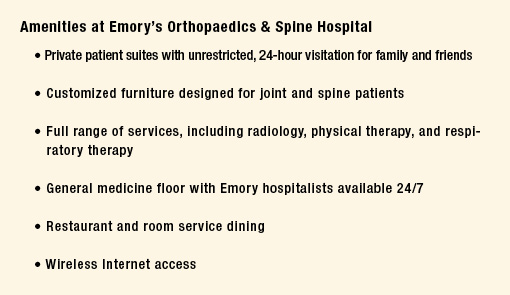A hopital realignment

What patients think counts at the new Emory University Orthopaedics & Spine Hospital, where a culture of patient care encourages collaboration between caregivers, patients, and families. |
by Tia McCollers
Emory Healthcare has positioned itself to be the backbone of orthopaedic and spine care in Georgia.
This fall, the Emory University Orthopaedics & Spine Hospital became the first university-affiliated surgical facility of its kind in the state, fusing advanced technology with a patient- and family-centered environment.
The next decade is projected to bring a 25% increase in demand for inpatient orthopaedic services. As the baby boomer population peaks, so will the need for knee and hip replacements and spinal surgeries. Seeing the forecasted demand for orthopaedic care, Emory has invested nearly $16 million to renovate the former Northlake Medical Center.
|
|
But the overhaul didn't stop with the building's structure. Emory also is building a culture of patient care, in which caregivers collaborate with patients and families on decisions. From the early planning phases, hospital administrators got patient input on the physical design and culture of the new hospital.
"We wanted an environment where families can feel empowered to speak up and share information that is needed in the patient's care plan," says Susan Grant, chief nursing officer for Emory Healthcare. The new approach equips patients and families to fully participate in their care. "Patients have relied on caregivers as the all-knowing source, instead of the caregivers soliciting information from the families that could be critical to their case. It's a different approach to what we've done traditionally in health care."
The concentration of orthopaedic and spine surgical services at one location—at the intersection of Lawrenceville Highway and I-285—maximizes the experience, research, and surgical procedures of full-time Emory physicians. It also offers the opportunity to combine the efficiency of a dedicated hospital with the expertise and sophistication of a university hospital system. As a result, patients are linked to research, technology, and subspecialties at other Emory hospitals.
"There are very few focused orthopaedic hospitals in the country," says James Roberson, who chairs Emory's orthopaedics department. "When you look at outcomes data of specialized facilities, it's clear that outcomes are better and patients have fewer complications, such as infections."
The new hospital is integrated with Emory's orthopaedics and spine center at Executive Park, Atlanta's largest outpatient facility. Executive Park continues to provide outpatient orthopaedic surgeries, while Emory Orthopaedics & Spine Hospital is the site for inpatient procedures. The new facility also houses general medical beds for patients with acute medical conditions. The change relieves operating space and reduces issues with overcrowding at Emory University Hospital on Clifton Road.




